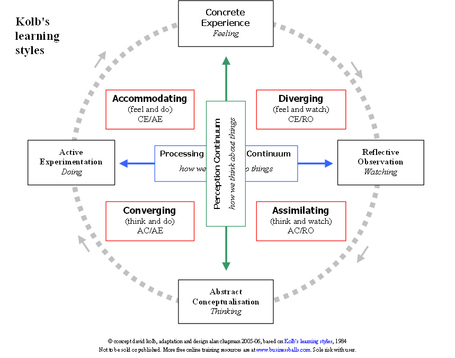2.2 Discovering your Learning Styles and Preferences
A Learning style is defined as…
“complex manner in which, and conditions under which, learners most efficiently and most effectively perceive, process, store, and recall what they are attempting to learn” James and Gardner (1995) (p. 20)
[Reference -- http://www.calpro-online.org/ERIC/docs/pab00007.pdf ]
David Kolb, Dunn and Dunn, Howard Gardner among others have worked extensively in understanding how adults learn.
“complex manner in which, and conditions under which, learners most efficiently and most effectively perceive, process, store, and recall what they are attempting to learn” James and Gardner (1995) (p. 20)
[Reference -- http://www.calpro-online.org/ERIC/docs/pab00007.pdf ]
David Kolb, Dunn and Dunn, Howard Gardner among others have worked extensively in understanding how adults learn.
Each of us process information differently, though we may share certain learning patterns, approaches, and preferences. Understanding how you learn has its implications on how you learn in this course and as designers when you work with students, professionals, colleagues etc.
Kolb Model
Kolb (1985) proposed a set of learning styles based on personality types and experiential learning-
Kolb Model
Kolb (1985) proposed a set of learning styles based on personality types and experiential learning-
Convergers acquire knowledge by thinking/analyzing and then practically applying the new ideas and/or concepts. The ability to practically apply ideas is this learner’s greatest strength. The emphasis for convergers is to think rationally had concretely while remaining relatively unemotional.
Divergers acquire knowledge through intuition, drawing on their imaginative aptitude and their ability to view complex situations from many perspectives. Divergers also possess the ability to effectively integrate information into meaningful wholes.
Assimilators create theoretical models and reason inductively. While they learn by thinking and analyzing and then planning and reflecting, they do not emphasize practical application, rather they focus on the development of theories, often discarding facts if they do not fit the theory.
Accommodators discard the theory if the facts do not fit and excel in situations where they must apply theories to specific circumstances. Their greatest strength is their ability for getting things done and becoming fully involved in new experiences. Accommodators approach problems in an intuitive, trial and error manner and they obtain information from other people rather than through their own analytic abilities.
Divergers acquire knowledge through intuition, drawing on their imaginative aptitude and their ability to view complex situations from many perspectives. Divergers also possess the ability to effectively integrate information into meaningful wholes.
Assimilators create theoretical models and reason inductively. While they learn by thinking and analyzing and then planning and reflecting, they do not emphasize practical application, rather they focus on the development of theories, often discarding facts if they do not fit the theory.
Accommodators discard the theory if the facts do not fit and excel in situations where they must apply theories to specific circumstances. Their greatest strength is their ability for getting things done and becoming fully involved in new experiences. Accommodators approach problems in an intuitive, trial and error manner and they obtain information from other people rather than through their own analytic abilities.
2.2.2 Required Readings
- Sugata Mitra - The Child Driven Education (Ted Talk)
- Meet the Net Generation in the work force. Research conducted by Accenture India
- Skim some of this pdf (it's 264 pages so I don't expect you to read it, rather to use as reference material) --Oblinger, D. & Oblinger, J. (2005) (Eds).Educating the Net Generation.



